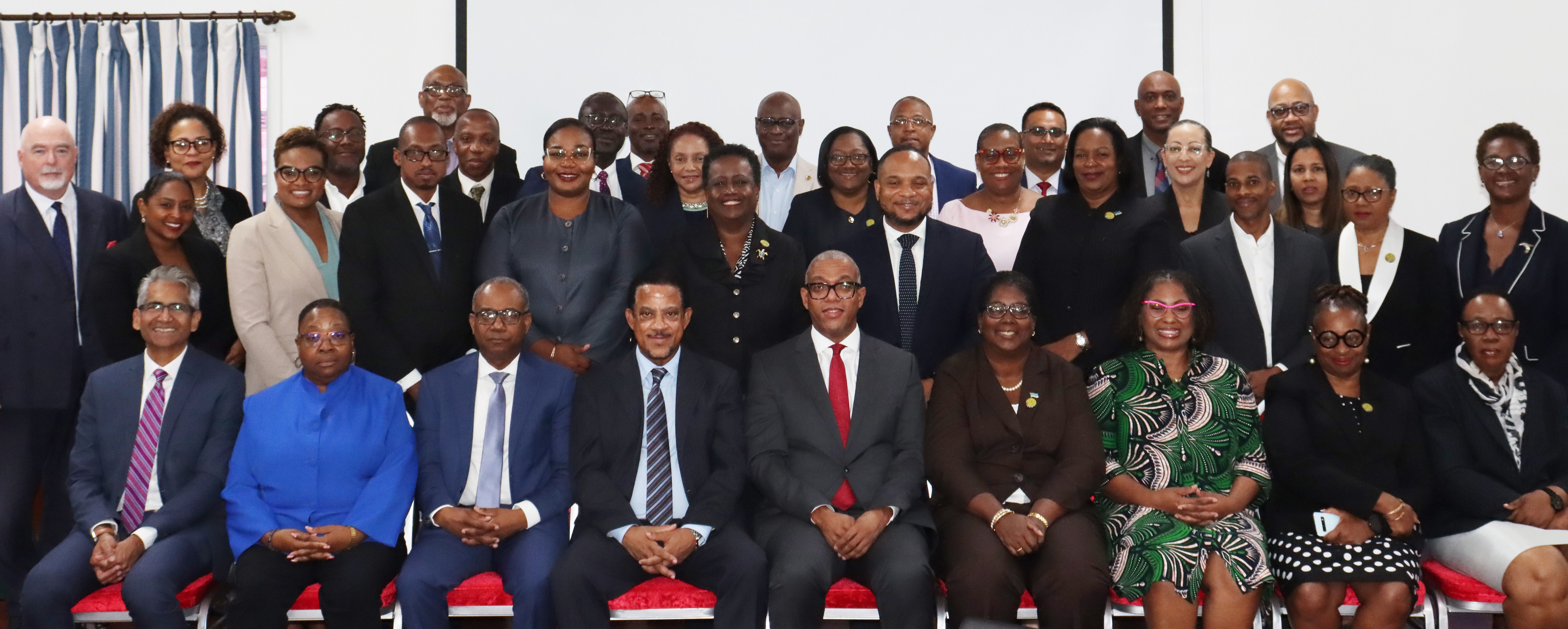Saint Lucia hosts Eastern Caribbean Supreme Court’s 2024 Annual Judicial Conference on Constitutional and Administrative Law
ECSC Media Release
Thursday 8th August 2024 — Judicial officers of the Eastern Caribbean Supreme Court converged in Saint Lucia for the Annual Judicial Conference 2024. The judges, masters and judicial research officers attended the three-day workshop hosted by the Judicial Education Institute of the Eastern Caribbean Supreme Court under the theme “Constitutional Law and Administrative Law”.
The conference, which was held at the Coco Palm Resorts from 5th to 7th August, commenced with a formal opening ceremony with welcome remarks by the incoming Chair of the Judicial Education Institute. His Lordship Hon. Eddy Ventose. Justice Ventose welcomed the participants and presenters firstly to Saint Lucia and to the signature event on the JEI’s training calendar. Justice Ventose formally recognized the presence of His Lordship, Hon. Mario Michel who was attending AJC 2024 in his new capacity as Acting Chief Justice of the ECSC. He also thanked the former Chief Justice, Dame Janice Pereira, DBE., LL.D, for her unwavering support of the AJC during her twelve-year tenure at the helm of the ECSC. Justice Ventose further expressed gratitude to the immediate past Chair of the JEI, Her Ladyship Hon. Gertel Thom, for her excellent stewardship of the Court’s education institute for the past six and a half years.
The opening remarks were delivered by the Attorney General of Saint Lucia the Hon. Leslie Mondesir, on behalf of Prime Minister of Saint Lucia, Hon. Phillip J. Pierre. Mr. Mondesir applauded the conference for its timely delivery of training on the critical areas of constitutional law and administrative law which are consistent with the Prime Minister’s call to action during his 45th national independence address, “for all sectors of society to protect our democratic freedoms, freedom of the press, free speech, the conventions of parliament, free and fair elections, social justice and enforcement of law and order in our country”.
The Attorney General emphasized that policy responses are necessary to “combat rising societal challenges” while providing impartial justice to the citizenry in our democratic society and reaffirmed the government’s steadfast support to the judiciary and unwavering commitment to upholding of the rule of law.
He ended by wishing the participants a successful conference and inviting all to the celebratory atmosphere to commemorate Saint Lucia’s Olympic performance.
His Lordship Hon. Mario Michel, Chief Justice (Ag.) was tasked with setting the stage of the judicial conference. He zoned in on the proceedings of the conference and provided attendees with a synopsis of the topics to be covered and what they can expect to be engaged in during the coming days. In so doing he reminded his audience of the significant role and power of the judiciary as part of the three branches of government.
His Lordship took the opportunity to introduce the esteemed team of facilitators which included Judges of the Caribbean Court of Justice, the Hon. Mr. Justice Winston Anderson, the Hon. Mr. Justice Denys Barrow, the Hon. Mr. Justice Bryan Sykes, Chief Justice, Supreme Court of Jamaica, the Hon. Mr. Justice Vasheist V Kokaram, Justice of Appeal, Supreme Court of Trinidad and Tobago, His Lordship Hon. Justice Eddy Ventose, Justice of Appeal, Eastern Caribbean Supreme Court, His Lordship Hon. Justice Gerhard Wallbank, High Court Judge Eastern Caribbean Supreme Court and Professor Tracy Robinson of the Faculty of Law, University of the West Indies, Mona Campus.
The Acting Chief Justice concluded his remarks by welcoming all to the island home of the fastest woman in the world, Ms. Julien Alfred who just days before capped the island’s first gold Olympic medal running the 100-meter sprint, to which the attendees broke into applause.
Under the tutelage of the subject expert judges and senior law professor the three-day workshop provided in-depth analysis on the principles, standards and complexities of constitutional law and administrative law, two very important areas in the approach to public law cases. Heavy reliance was made on the authoritative cases of Court of Appeal Judges Justice Peter Jamadar and then Justice of Appeal, Justice Andrian Saunders in support of the conference theme. The distinguished facilitators brought practical experience and recall of historical events coupled with the use of hypothetical scenarios and power point presentations to the working sessions.
The topics engaged in, covered the question of locus standing on public law proceedings and its merit and relevance to public importance. Alternative remedies and collateral relief in Caribbean constitutional law as well as remedies for constitutional infringements, the implied principles and the basic structure doctrine. Under the broad subject of administrative law the judicial officers delved into the supervisory principles under which the Supreme Court exercises supervisory jurisdiction over executive acts. These topics addressed exclusions of judicial review, the criminal trial process, the principle of Wednesbury unreasonableness and proportionality and judgment writing, the reasons for and consequences of justice delayed.
The Annual Judicial Conference 2024 was marked with high quality presentations, stimulating, animated discussions, debates and the exchange of experiences and best practices. During one of his presentations, Justice Vasheist V Kokoram reminded the attendees that “we are a young generation of judges, the baton now passed to be the guardians of the constitution from incursions by the legislature or executive action.
Generally, we are duty bound to interrogate, reflect, muse and paint a new canvass, touch up old edges”.
Conference participants hailed this, yet another rich and successful conference hosted by the JEI and another opportunity to meet and greet their counterparts while engaging in stimulating discourse.
To learn more about the Judicial Education Institute of the Eastern Caribbean Supreme Court please visit our website at: www.eccourts.org or call us at Tel: 758-457-3600.
This media release is courtesy of the Eastern Caribbean Supreme Court.
